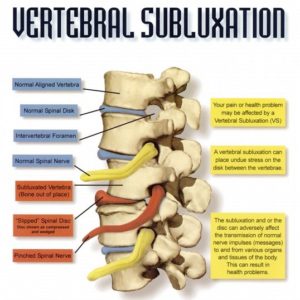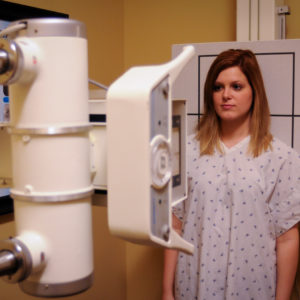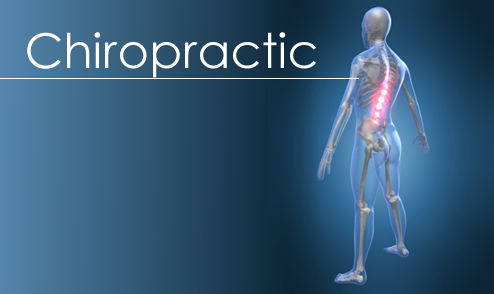CAN CHIROPRACTIC HELP YOU?
Each year millions of people are enjoying the most popular natural, drug-free healthcare system in the world—CHIROPRACTIC! Originally discovered in America, chiropractic now spans the world, with practitioners in most countries and with 45 chiropractic colleges in North & South America, Europe, Asia, Australia, Africa and New Zealand.
WHAT IS IT ABOUT THIS HEALING ART THAT MAKES IT SO POPULAR?
It’s simple: chiropractic helps people function better physically and emotionally. People feel better,
recover from sickness, disease and disability faster and minimize the use of drugs and surgery in their lives! Many who choose a chiropractic lifestyle report less stress, more vitality and more life enjoyment!1-7
WHAT IS CHIROPRACTIC?
 Chiropractic is a healthcare system that releases a serious stress from your body: the subluxation. A subluxation is an often painless, tiny distortion in your structure that can affect your nerves, muscles, energy, brain function, internal organs, discs, bones, tendons, ligaments, posture and overall health and vitality.
Chiropractic is a healthcare system that releases a serious stress from your body: the subluxation. A subluxation is an often painless, tiny distortion in your structure that can affect your nerves, muscles, energy, brain function, internal organs, discs, bones, tendons, ligaments, posture and overall health and vitality.
HOW DO WE GET SUBLUXATIONS?
Subluxations are caused by stress of all kinds including physical stress such as poor posture, accidents, sitting or working in the same position for long periods, sports injuries and any kind of physical trauma even if seemingly mild.
It may surprise you to discover that a stressful birth or a childhood fall can cause health problems that may not surface until decades later. Without a chiropractic checkup these old, long-standing subluxations may never be found and corrected. The result? Adults with physical and/or emotional disease or malfunction and subsequent health problems.
Studies reveal that nearly everyone has subluxations; it is a “hidden epidemic. For that reason you and your family need to see a doctor of chiropractic for a checkup—just as you get your eyes, teeth and blood pressure checked!
HOW WAS CHIROPRACTIC DISCOVERED?
Modern chiropractic was discovered in 1895 in Davenport, Iowa when Dr. D.D. Palmer performed the first chiropractic “adjustment” on his deaf janitor, Harvey Lillard. Lillard had been deaf for seventeen years after a slight accident and yet his hearing returned after Dr. Palmer worked on him.
At first Dr. Palmer thought he had discovered a cure for deafness. But as patients with digestive troubles, sciatica, menstrual troubles, migraine headaches, epilepsy, heart problems, back pain and many other conditions responded to his “hand treatments” (as he first called them), he realized that he had discovered something more far-reaching indeed.8
WHY CHOOSE CHIROPRACTIC?
People like chiropractors because they approach healthcare in a unique manner. Instead of a disease orientation (diagnosis and treatment of disease), your chiropractor’s purpose is to enhance your health. He/she does this by analyzing your body for, and eliminating, your subluxations. Without the stress of subluxations your body and mind function better, your healing ability is enhanced, your immunity to disease strengthens, your sleep deepens and your energy improves.
orientation (diagnosis and treatment of disease), your chiropractor’s purpose is to enhance your health. He/she does this by analyzing your body for, and eliminating, your subluxations. Without the stress of subluxations your body and mind function better, your healing ability is enhanced, your immunity to disease strengthens, your sleep deepens and your energy improves.
The medical approach of waiting for symptoms to appear before addressing one’s health is limited.
By the time symptoms first appear you could have been deteriorating for years. The chiropractic approach is to get your body working well now! Chiropractors can analyze your body and locate (and correct) your subluxations before symptoms appear and before problems get worse.
Of course, if you presently are ill and suffering, you need your natural healing ability enhanced so you can better fight disease and return yourself to a state of balance and health. That is a fact no matter what disease or condition you may have. By correcting your subluxations, chiropractors help activate your natural healing ability to function at its optimum—to awaken your “inner healer.”
That’s why increasing numbers of people are seeing chiropractors for health problems—but not only for health problems. Many people are also seeing chiropractors to maintain and enhance their health, for better sports performance, for natural immunity—and a drug-free lifestyle.
WHAT DOES A CHIROPRACTOR DO?
 Your doctor of chiropractic is specially trained to analyze your body for subluxations. Using special chiropractic adjustment techniques, your chiropractor safely, gently and painlessly corrects your subluxations, ridding your body of this health-damaging condition.
Your doctor of chiropractic is specially trained to analyze your body for subluxations. Using special chiropractic adjustment techniques, your chiropractor safely, gently and painlessly corrects your subluxations, ridding your body of this health-damaging condition.
- Could You Benefit From Chiropractic?
Walk into a chiropractor’s office and who do you see? People with all kinds of problems: colds, flu, allergies, hearing problems, ear infections, spinal or disc problems, pain, whiplash, arthritis, insomnia, stress, vision problems, headaches, PMS, allergies, bed-wetting, colic, high blood pressure—the list is very long. For over a hundred years people have visited their neighborhood doctor of chiropractic for nearly every health condition!9-14
- A UNIQUE PLACE!
Chiropractic occupies a unique place in modern healthcare. It draws upon modern scientific knowledge of anatomy and physiology using imaging tools such as X-rays and MRI, infrared and electronic scanners and other tools, yet chiropractic respects the ancient concepts of self-healing, life energy and a holistic approach to health. Your chiropractor’s goal is to turn on your “inner healer” and awaken your natural healing ability.
of anatomy and physiology using imaging tools such as X-rays and MRI, infrared and electronic scanners and other tools, yet chiropractic respects the ancient concepts of self-healing, life energy and a holistic approach to health. Your chiropractor’s goal is to turn on your “inner healer” and awaken your natural healing ability.
So if you’re tired of being sick and tired, tired of being told “you’ve just got to learn to live with it,” and are looking for a natural method of regaining health and wholeness without polluting your body with chemicals and worrying about side effects, why not join the millions who have discovered the wonders of this amazing healthcare system?
Why live with health problems when you can live without them? Discover chiropractic—discover how natural health can be.
Call us to make your appointment today! (661) 942-5000.
References:
1. Meade TW. Follow-up to Meade study. British Medical Journal. August 5, 1995.
2. Blanks RHI, Schuster TL et al. A retrospective assessment of network care using a survey of self-rated health, wellness and quality of life. JVSR. 1997;1(4):41-48.
3. Marino MJ, Langrell PM. A longitudinal assessment of chiropractic care using a survey of self-rated health wellness & quality of life: a preliminary study. JVSR. 1999;3(2):65-73.
4. Owens EF, Hoiriis KT, Burd D. Changes in general health status during upper cervical chiropractic care: PBR report. CRJ. 1995;5(1):9-16.
5. Bronfort G, Haas M, Evans R, Leiniger B, Triano J. Effectiveness of manual therapies: the UK evidence report. Chiropractic & Osteopathy. 2010;18(1):3.
6. Bryans R, Descarreaux M, Duranleau et al. Evidence-based guidelines for the chiropractic treatment of adults with headache. JMPT. 2011;34(5):274-289.
7. Rubenstein SM, Van Middelkoop M et al. Spinal manipulative therapy for chronic low-back pain: an update of a Cochrane review. Spine. 2011;36(13):E825-E846.
8. Palmer DD. The Chiropractor’s Adjustor. Portland, OR: 1910.
9. Ressel O, Rudy R. Vertebral subluxation correlated with somatic, visceral and Immune complaints: an analysis of 650 children under chiropractic care. Journal of Vertebral Subluxation Research. October 18, 2004;1-23.
10. Boone WR, Oswald P, Holt K et al. Long term assessment of blood indices and immune panel profiling of subjects receiving chiropractic care: a pilot study. Journal of Vertebral Subluxation Research. June 7, 2006;1-11.
11. Alcantara J, Ohm J, Kunz D. Treatment-related aggravations, complications and improvements attributed to chiropractic spinal manipulative therapy of pediatric patients: a practice-based survey of practitioners. Pediatric CAM Research Day, University of Alberta, Canada. December 11, 2007.
12. Nyiendo J, Olsen E. Characteristics of 217 children attending a chiropractic college teaching clinic. JMPT. 1988;11(2):78-84.
13. Clum G. Jocks and chiropractic care. The Latest Stuff from Gerry. November 1998 issue (on-line).
14. Lauro A, Mouch B. Chiropractic effects on athletic ability. Chiropractic: The Journal of Chiropractic Research and Clinical Investigation. 1991;6:84-87.

